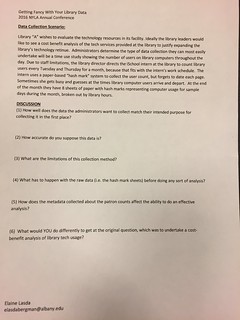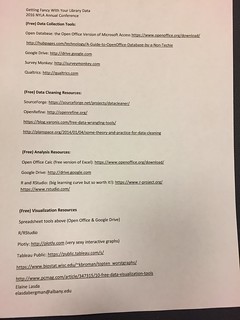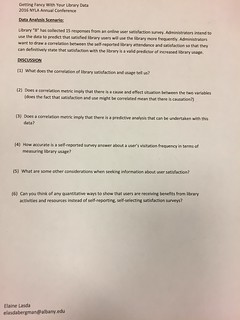 |
| Data Collection Scenario A |
Some
stakeholders respond better to data. In fact, many of our stakeholders
respond well to data. Data can tell us about our impact. Anecdotes can
play very well, too, with some people.
What is data? Lots of things are and format can affect what you can do with it.
Elaine Lasda focused on quantitative data during the session, but wanted people to realize that data isn't always numbers.
What are the limitations to data?
- People can argue over the interpretation of the data.
- It doesn't account for a person's gut (feelings).
Data can provide actionable insights. (This is what we want.)
Data Collection is where it starts.
- Remember garbage in, garbage out.
- Was the data collected correctly?
- Does the data fit the purpose?
Data collection scenario "A" (see image)
- Need a clear definition of what you're looking for.
- What is the best way of collecting the data?
- Make sure that the data is collected accurately.
- As much as possible, eliminate the possibility of errors in the data.
Data Cleaning: (See tools list below.)
- Data cleaning can take up to 80% of your time. While it is critically important, it is not "sexy."
- This is putting the data into the format that you need and doing any normalizing.
 |
| Data Cleaning Resources |
Data Analysis:
- Going from data to information to knowledge to wisdom
 |
| Data Collection Scenario B |
Remember that correlation does not mean causation.
How do you get data from non-library users? One person paired public library staff with board members who then went to different places on a Saturday to interview people.
Data Presentation: With the chart and graphs, make sure the scale does not lead people astray in interpreting the information.
Top10 Worst Graphs in Science (web page)
Elaine suggests that people use free and low cost data tools. She said that you don't always need expensive tools.
Her library has use data analysis to improve workflow.
Resources:
Resources:
No comments:
Post a Comment